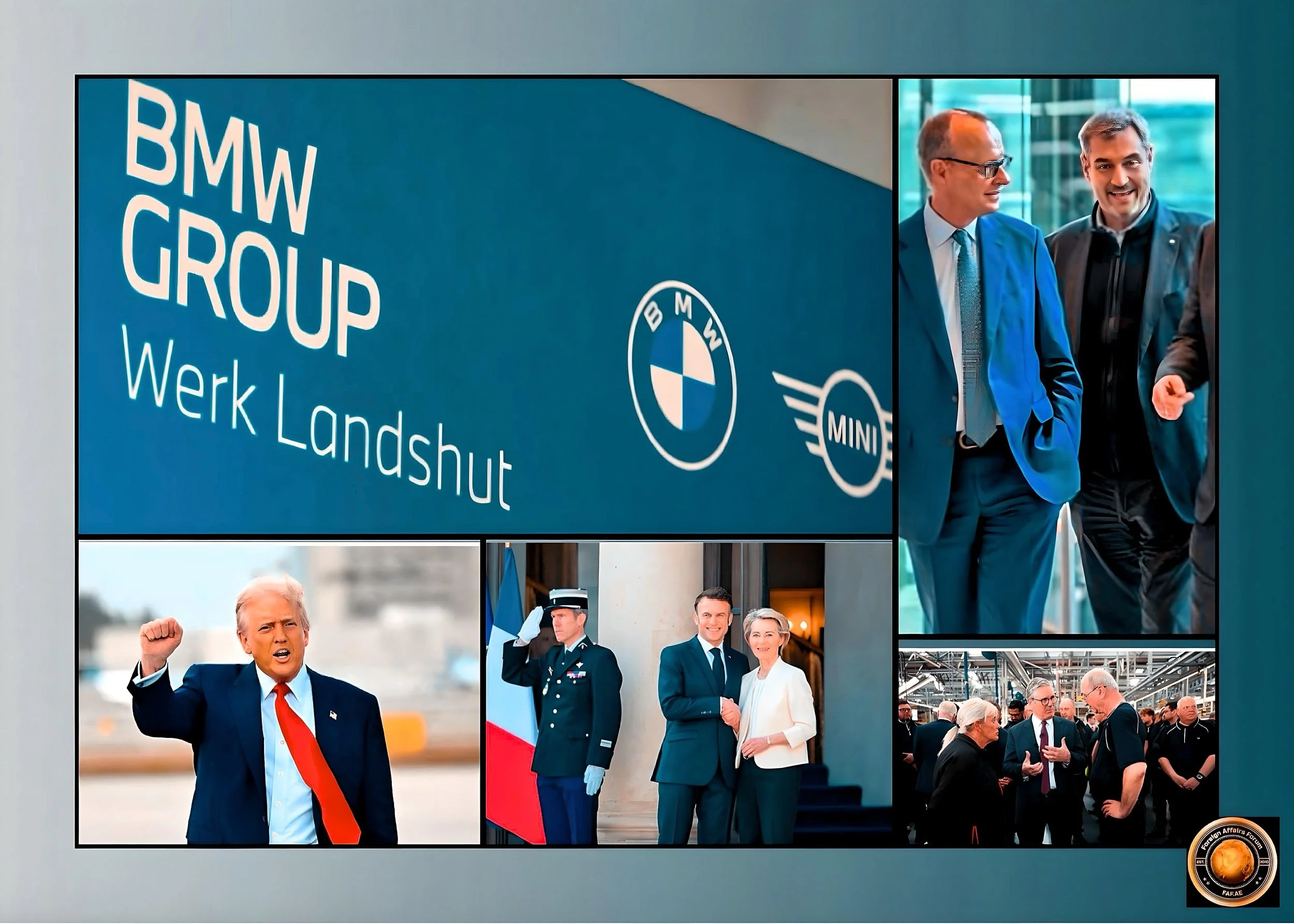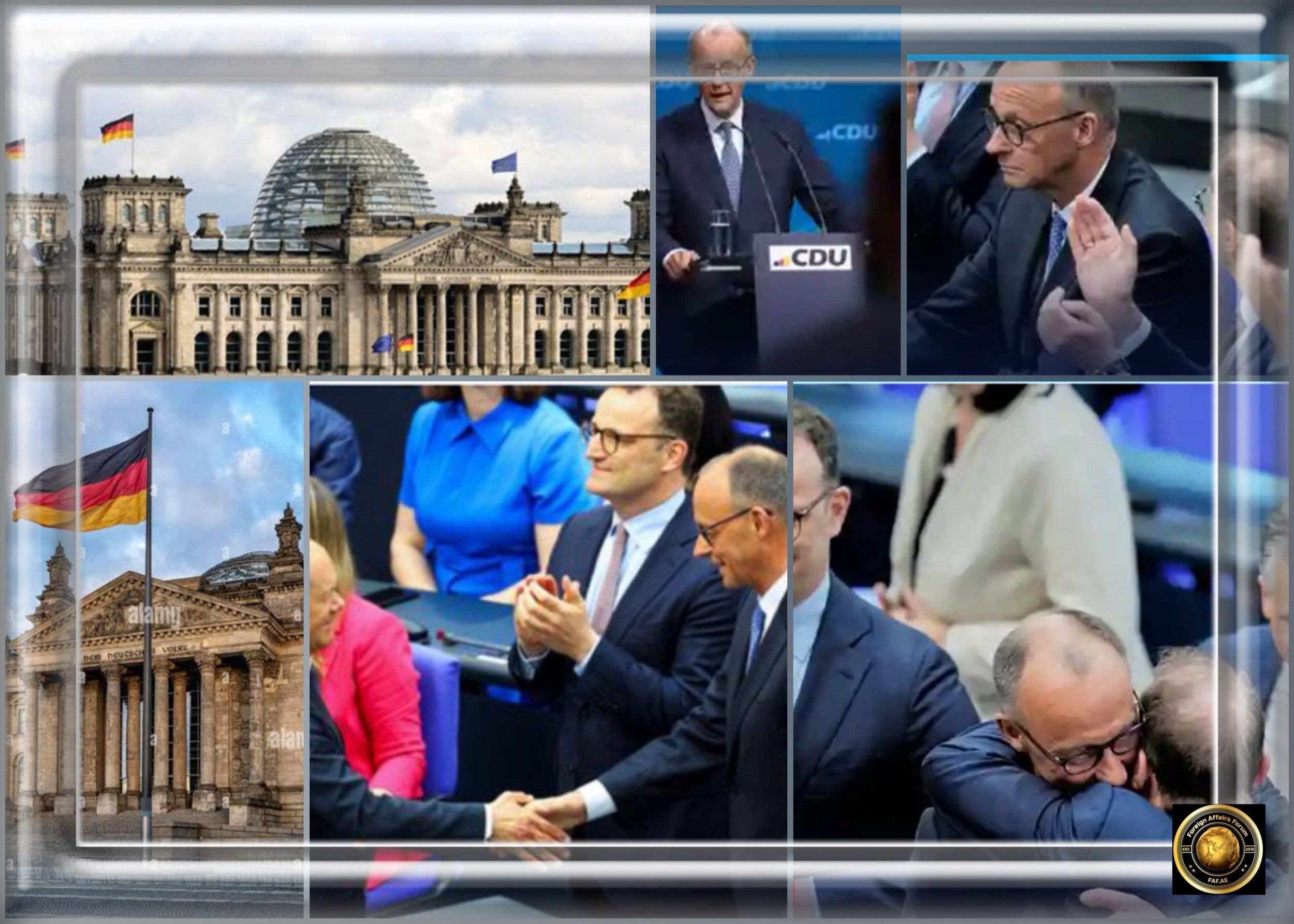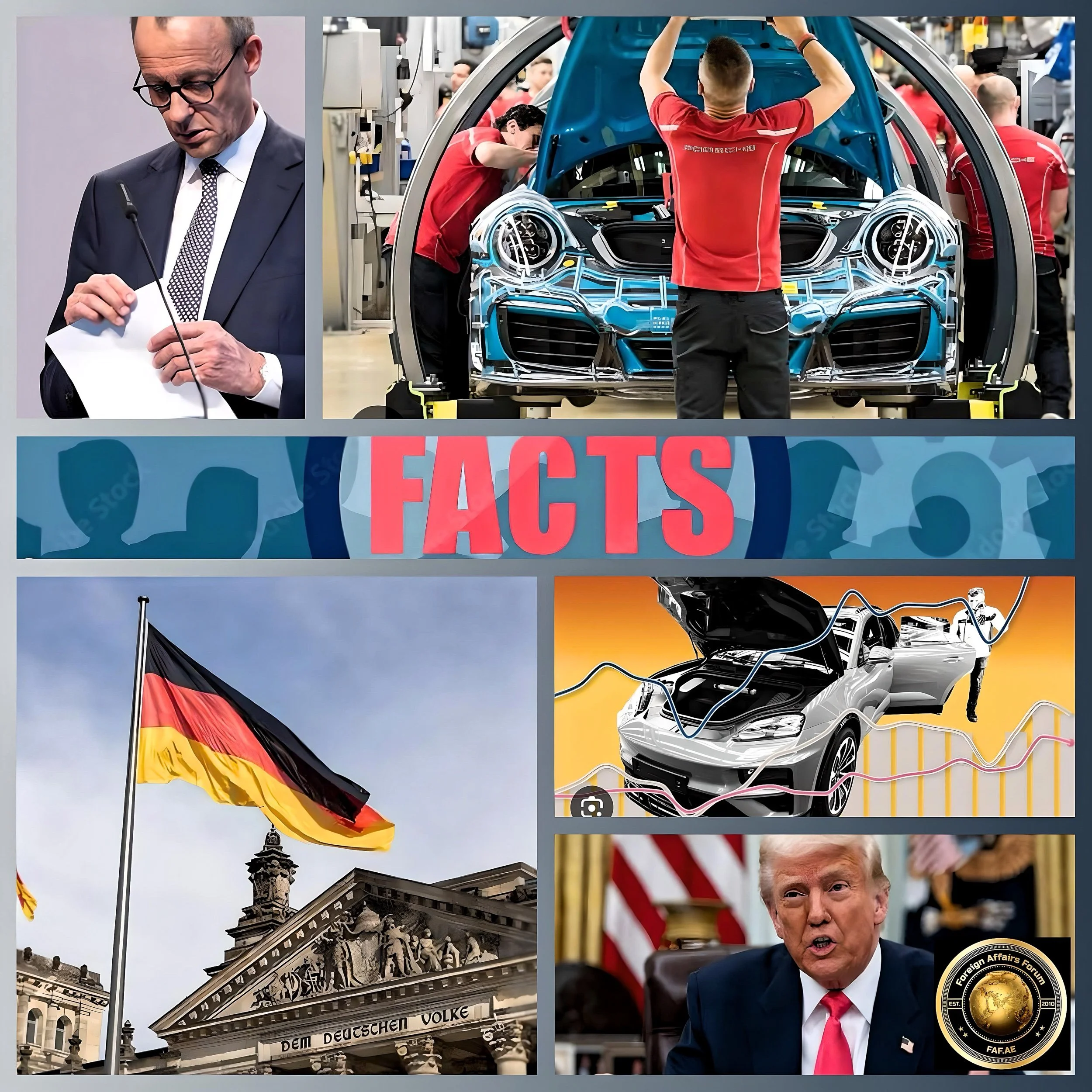Trump’s Tariffs on German Auto Industry: Economic Impact and International Response
Introduction
As of April 2025, the global automotive industry is facing significant disruption following U.S. President Donald Trump’s implementation of sweeping tariffs that have particularly impacted Germany’s already struggling car sector.
FAF's comprehensive analysis examines German automakers' challenges, Friedrich Merz’s economic response plans, the European Union’s coordinated efforts, and the UK’s divergent negotiation strategy.
Germany’s Auto Industry Under Severe Pressure
The Perfect Storm of Tariffs and Existing Challenges
The German automotive industry, a cornerstone of the country’s economy, faces what experts describe as a “perfect storm” of challenges. President Trump’s 25% tariffs on imported vehicles and automotive parts, effective April 2-3, 2025, have dealt a devastating blow to German carmakers relying heavily on the U.S. market.
These tariffs come at a particularly vulnerable time, as the industry was already struggling with:
The challenging transition from combustion engines to electric vehicles where Germany lacks control of crucial battery technology
Slumping demand for electric vehicles in Europe
High energy and labor costs affecting production
Collapsing sales in China, a key market
Aggressive competition from Chinese manufacturers
German economy minister Robert Habeck stated firmly that the EU must “respond firmly” to these tariffs, adding: “It must be clear that we will not give in to the US.
We need to show strength and self-confidence”. This strong language reflects the severity of the situation for an industry that has historically been Germany’s economic powerhouse.
Immediate Market Impact and Job Concerns
The market response to Trump’s tariffs has been swift and severe. Automotive stocks from Japan to Germany dropped immediately following the announcement, with Germany’s benchmark index among the worst hit in the euro area. It opened approximately 10% lower on April 7th before recovering some losses.
The human cost could be even more severe, with fifteen German mayors warning in February that up to 600,000 jobs in the auto industry were at risk even before the tariffs were implemented. This warning has proven prescient as manufacturers have begun taking drastic actions:
Audi, Volkswagen’s premium brand, has suspended car exports from Europe to the U.S.
Other manufacturers like Jaguar Land Rover have temporarily ceased exports to the United States
Production facilities in Canada and Mexico are being closed, affecting supply chains that include German components
The tariffs will significantly increase vehicle prices in the U.S. market, with analysts estimating increases of $4,000-$10,000 per vehicle, depending on the model.
For luxury German vehicles, the price impact could exceed $20,000 per unit.
Merz’s Economic Response Strategy
The Chancellor-in-Waiting’s Urgent Call to Action
Friedrich Merz, Germany’s likely next chancellor following his conservative CDU/CSU coalition’s victory in February’s elections, has urgently responded to the economic threat of Trump’s tariffs.
On April 7th, as markets plunged, Merz issued a clear statement
“The situation on the international equity and bond markets is dramatic and threatens to deteriorate further. It is therefore more urgent than ever for Germany to restore its international competitiveness as quickly as possible”.
Merz has addressed this crisis at the center of his ongoing coalition negotiations with the Social Democrats, emphasizing that Germany must swiftly respond to avoid further economic deterioration.
The “Double Bazooka” Economic Plan
Even before Trump’s tariffs were announced, Merz had been developing what financial analysts have described as a “radical spending plan” or “double bazooka” to revitalize Germany’s struggling economy. His ambitious economic strategy includes:
A massive €500 billion ($544 billion) infrastructure investment fund to modernize Germany’s infrastructure over 12 years
Constitutional changes to Germany’s strict “debt brake” rules to allow increased borrowing for defense and security spending
Tax cuts for businesses and reduced bureaucracy to enhance competitiveness
Lower energy prices to support energy-intensive industries
Potential reintroduction of subsidies for electric vehicle purchases
Merz successfully navigated parliamentary approval for these plans in March, securing support from both houses of Germany’s parliament.
The infrastructure fund includes €100 billion earmarked for climate-related projects, a concession to gain Green Party support for the constitutional changes needed to implement his plan.
Challenges in Implementation
Despite securing political backing for his economic plan, Merz faces significant challenges in implementation.
Germany has historically struggled with effectively deploying large-scale infrastructure investments. Additionally, his coalition negotiations have been complicated by:
The need to balance competing priorities among potential coalition partners
Criticism from fiscal conservatives within his party about increased debt
Opposition from far-right parties who have described his plan as a “fiscal coup d’état.”
The immediate pressure of responding to Trump’s tariffs while still forming a government
The Sentix survey of eurozone investors showed sentiment plummeting to its lowest point in more than a year in April, as trade war fears overshadowed initial excitement about Merz’s spending plans.
The European Union’s Coordinated Response
Diplomatic Outreach and Trade Proposals
The European Union has coordinated its efforts to address Trump’s tariffs on behalf of all member states, including Germany.
EU Commission President Ursula von der Leyen has offered the United States a “zero-for-zero” tariff scheme for industrial goods. This proposal would eliminate tariffs on industrial products between the two economic blocs:
“We have offered zero-for-zero tariffs for industrial goods as we have successfully done with many other trading partners.
Because Europe is always ready for a good deal, we keep it on the table,” von der Leyen stated at a press conference.
This proposal echoes elements of the Transatlantic Trade and Investment Partnership (TTIP) negotiated a decade ago but ultimately abandoned when Trump first took office in 2018.
Preparing for Potential Retaliation
While pursuing diplomatic solutions, the EU has warned it has a “strong plan” to retaliate against U.S. trade measures if necessary. The European Commission seeks to coordinate this response for all EU countries, including Germany.
The challenge for the EU is balancing the differing impacts of the tariffs across member states. While countries like Germany with strong automotive sectors are particularly affected, other EU members have varying degrees of exposure to U.S. tariffs.
For the automotive supply chain specifically, Benjamin Krieger, Secretary General of the European Association of Automotive Suppliers (CLEPA), expressed concern about the industry's global integration: “Components often cross several borders.
When we impose a tariff between the location of vehicle assembly and the source of inputs, it escalates costs, and typically, the automotive suppliers bear this burden”.
The UK’s Divergent Approach to Tariff Negotiations
Britain’s “Cool Heads” Strategy
In contrast to the EU’s more confrontational stance, the United Kingdom, under Prime Minister Keir Starmer, has adopted what has been described as a “cool-headed” approach to addressing Trump’s tariffs.
The UK was hit with 10% tariffs—lower than the EU’s 20% and China’s 34%—which British officials attribute to Starmer’s strategic approach to dealing with Trump.
Starmer has resisted calls for immediate retaliation, instead focusing on direct bilateral negotiations with the U.S. administration.
British officials believe they may soon finalize a deal to eliminate or reduce the tariffs imposed on Britain, and an agreement is expected to be reached within weeks.
Concrete Trade Concessions
The UK has already proposed specific trade concessions to secure a deal with the Trump administration:
Lowering tariffs on American beef and fish
Potentially reducing taxes levied on major American tech corporations operating in Britain
Increasing defense spending to 2.5% of GDP within two years, aligning with Trump’s demands for NATO allies
Starmer has maintained this approach despite criticism from some who accuse him of being overly accommodating to Trump.
The UK government has also rejected calls for a “buy British” campaign in response to the tariffs, with a representative for Starmer stating that the UK operates as “an open-trading nation” and would not dictate where individuals should procure their goods.
Outlook: Economic Uncertainty Amid Global Trade Tensions
Implementing Trump’s tariffs marks a significant escalation in global trade tensions, which has particular implications for Germany’s automotive sector. Several factors will determine the economic outcome in the coming months:
The effectiveness of Merz’s economic stimulus: Whether Germany can successfully deploy its ambitious infrastructure and defense spending to offset the negative impact of tariffs
The outcome of EU-US negotiations: The potential for a broader trade agreement that could reduce or eliminate tariffs for all EU members
The response of auto manufacturers: How companies adjust their global supply chains and pricing strategies to accommodate the tariffs
Market demand shifts: How U.S. consumers respond to higher prices for imported vehicles and whether this creates opportunities for domestic manufacturers
Analysts warn that these new tariffs will “exacerbate global uncertainties and represent another blow to the increasingly undermined rules-based global trading system.”
For Germany, navigating this crisis will be a defining challenge for Merz’s incoming government as it attempts to pull Europe’s largest economy out of its two-year recession.
Conclusion
Trump’s tariffs have hit Germany’s automotive industry at a particularly vulnerable moment, threatening jobs, economic growth, and the future of a sector that has defined German industrial prowess for decades.
While Merz’s ambitious economic plans offer a potential pathway to addressing broader structural challenges, the tariffs' immediate impact requires coordinated action with European partners.
The contrasting approaches of the EU, emphasizing collective bargaining power and potential retaliation, and the UK, focusing on bilateral negotiation and concessions, highlight the divergent strategies nations are adopting in response to Trump’s protectionist policies.
QAs these responses unfold, Germany’s automotive industry's resilience and ability to adapt to this new economic landscape will be severely tested.






